Official Development Assistance (ODA)
|
|
| >>ODA Policy on Environment >>Good Practices on Environment |
Last Updated: November 19, 2007 |

Japan is committed to addressing environmental issues and has been providing assistance based on the "Environmental Conservation Initiative for Sustainable Development (EcoISD)" announced at the World Summit on Sustainable Development in Johannesburg, in 2002
References:Japan's Environmental ODA (Japanese (PDF, 208KB)![]() )
)
Japan's International Cooperation on Climate Change
(Japanese (PDF, 1.12MB)![]() / English (PDF, 1.20MB)
/ English (PDF, 1.20MB)![]() )
)
- The Framework Featured in ODA Charter & Mid-Term Policy (Extracts)
Japan's Official Development Assistance Charter (August, 2003)
I. Philosophy ——Objectives, Policies, and Priorities
2. Basic Policies
(3) Assurance of Fairness
In formulating and implementing assistance policies, Japan will take steps to assure fairness. This should be achieved by giving consideration to the condition of the socially vulnerable and the gap between the rich and the poor as well as the gap among various regions in developing countries. Furthermore, great attention will be paid with respect to factors such as environmental and social impact on developing countries of the implementation of ODA.
In particular, the perspective of gender equality is important. Japan will make further efforts to improve the status of women, giving full consideration to the active participation of women in development, and to ensuring that women reap benefits from development.
3. Priority Issues
(3) Addressing Global Issues
As for global issues such as global warming and other environmental problems, infectious diseases, population, food, energy, natural disasters, terrorism, drugs, and internationally organized crimes, further efforts must be given immediately and in a coordinated manner by the international community. Japan will address these issues through ODA and will play an active role in the creation of international norms.
II. Principle of ODA Implementation
(1) Environmental conservation and development should be pursued in tandem.
III. Formulation and Implementation of ODA Policy
3. Matters Essential to Effective Implementation
(2) Ensuring Appropriate Procedures
The government will adopt procedures to ensure that full consideration is given to the environmental and social impact of implementation of ODA. The government will make efforts to conduct appropriate and efficient procurement with regard to quality and price. At the same time, while ensuring these aspects, the procedures will be simplified and accelerated.
Japan's Medium-Term Policy on ODA (February, 2005)
3. Priority Issues
(1) Poverty Reduction
ii. Approach to Poverty Reduction and Specific Actions
(c) Assistance to Reduce Poverty Through Economic Growth
(ii) Balanced Development
Countries that are achieving economic growth also face the problem of regional disparities. These disparities occur in many cases between poor rural areas and comparatively affluent urban areas. For the development of rural areas, raising agricultural productivity is important. Japan will support the formulation of agriculture related policy, improvement of infrastructure such as irrigation and farm roads, dissemination and research/development of production technologies such as NERICA (New Rice for Africa), and strengthening of community organizations. Assistance will be provided to foster economic activities in rural areas, such as processing of agricultural products, development of market distribution and sale of foodstuffs
(2) Sustainable Growth
ii. Approach to Sustainable Growth and Specific Actions
(a) Development of Economic and Social Infrastructure
In the construction of infrastructure, full attention will be given to social and environmental considerations.
(3) Addressing Global Issues
Global issues such as global warming and other environmental problems, infectious diseases, population, food, energy, natural disasters, terrorism, drugs and internationally organized crimes pose a threat to humanity around the world, irrespective of national borders. In order to achieve the stability and prosperity of the international community, Japan will play an active part in addressing these issues by using its ODA. Of these issues, the Medium-Term Policy will focus particularly on environmental problems that are inextricably and comprehensively related to reducing poverty and achieving sustainable growth. The Medium-Term policy also addresses measures against natural disasters such as earthquakes and tsunamis in view of the disaster caused by the major earthquake off the coast of Sumatra and the tsunami in the Indian Ocean that occurred in December 2004.
i. Japan's Position on Addressing Environmental Problems and Natural Disasters
(a) Making development compatible with the environment and promoting sustainable development are challenges that the entire world faces. Progressing global warming, severe environmental pollution accompanying economic growth in developing countries, and rapid deterioration of the natural environment against the background of population growth and poverty threaten the lives of people in developing countries. In order to solve these environmental problems, broad-reaching and coherent action is required. Disasters such as earthquakes and tsunamis continue to threaten human life and economic and social development for a further period following the immediate aftermath. Therefore it is essential to support self-help efforts by developing countries and to take coherent measures corresponding to each phase of disaster including emergency response, reconstruction and prevention.
(b) Japan will actively address environmental problems and natural disasters by making use of its ODA based on initiatives such as the Environmental Conservation Initiative for Sustainable Development (EcoISD), the Kyoto Initiative, and the Initiative for Disaster Reduction through ODA.
ii. Approach to Addressing Environmental Problems and Specific Actions
Japan will give high priority to cooperation in the following three fields: (1) actions against global warming, such as controlling and reducing emissions of greenhouse gases through the use of renewable energy sources and energy saving measures (including assistance regarding the use of Kyoto Mechanism) and adaptation to the adverse effects of climate change (including measures against meteorological disasters); (2) pollution control through measures on air pollution, water contamination, and waste management, etc.; and (3) conservation of the natural environment by means such as the management of nature reserves, conservation and management of forests, measures against desertification, and natural resource management. Cooperation will be provided based on the following approaches and specific actions:
(a) Capacity Development of Developing Countries to Address Environmental Problems
In order to enhance the overall capacity of the authorities, research institutes and other agencies in developing countries to address environmental problems, Japan will support human resource development and provide cooperation to assist accurate environmental monitoring, policy making, institution building, and equipment provision suited to the actual situations in individual countries.
(b) Active Integration of Environmental Elements
Japan will incorporate environmental elements into its development plans and programs, and cooperate in projects in developing countries in which appropriate environmental and social considerations are implemented or confirmed.
(c) Japan's Guiding Role
Japan will seek to raise environmental awareness and encourage efforts to address environmental problems in developing countries through policy dialogues, various forums, and other appropriate cooperation schemes.
(d) Cooperation Based on Broad and Comprehensive Frameworks
In order to solve regional and global environmental problems, Japan will implement its cooperation based on broad and comprehensive frameworks that effectively combine various methods of cooperation.
(e) Application of Japanese Experience and Scientific Technology
Japan will provide support to developing countries by making use of its experience and know-how in overcoming environmental problems and its scientific technology in combating complex environmental problems. Such experience, know-how and technology for pollution monitoring, data analysis and counter approaches have been accumulated by a broad range of organizations outside government in Japan, including local governments, private enterprises, research institutions, NGOs, and others. Thus, Japan will actively collaborate with such organizations in assisting developing countries. Collaboration will also be pursued with international organizations that have specialized knowledge and means of implementation.
iii. Approach to Address Disasters and Specific Actions
Japan will cope with disasters such as earthquakes and tsunamis through a similar approach mentioned above by utilizing its own experiences, technology (including scientific technology related to observation) and human resources in which it has international comparative advantage.
- Initiatives & Funding Commitment
![]() Environmental Conservation Initiative for Sustainable Development (EcoISD) (August, 2002)
Environmental Conservation Initiative for Sustainable Development (EcoISD) (August, 2002)
- Summary (Japanese / English)
- Full Text (Japanese / English)
![]() The Kyoto Initiative (December, 1997)
The Kyoto Initiative (December, 1997)
- Summary (Japanese / English)
- Full Text (Japanese / English)
- Measures for Global Warming
Global Warming Measures Course (Group Training):
Technical Cooperation to Combat Global Warming
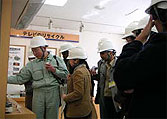
Development of Strategies on Challenging Climate Change
The purpose of this training course is to assist developing countries to ratify and realize the United Nations Framework Convention on Climate Change (UNFCCC) through sharing the latest scientific and technical knowledge concerning UNFCCC and presenting Japan's countermeasures against global warming. This training course includes lectures on methods to integrate climate change policy into development policy, development of national communications, impact assessment on climate change, development of inventories of green house gas emissions etc. and group work on action plans to address global warming.
Egypt: Zafarana Wind Power Plant Project: Japanese ODA Loan Cooperation
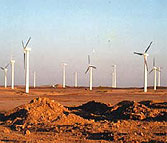
Zafarana Wind Power Plant Project
A Japanese ODA loan has supported the construction of a wind power plant in Zafarana on the coast of the Red Sea, 220km southeast of the capital Cairo. The plant will have a power capacity of 120MW. This project is expected to mitigate air pollution and global warming by utilizing wind power and to stabilize the electricity supply in Egypt. The project was registered as CDM project after being approved by the United Nations CDM Committee on June 22, 2007.
- Measures for Environmental Pollution
China: The Japan-China Friendship Center for Environmental Protection (Phase III):
Grant aid/Technical Cooperation for Capacity Development Towards Environmental Management

The Japan-China Friendship Center for Environmental Protection (China)
A key feature of Japanese cooperation on Environmental issues with developing countries is the promotion of ownership by the recipient government; thus, fostering the country's ability to take its own environmental protection measures. To this end and as one of measures aimed at strengthening China's administrative structure for environmental protection, Japan has been pursuing an environment oriented approach. This assistance combines the construction of center facilities (grant aid) with various undertakings in technical cooperation projects that require greater participation from the recipient's side, conforming to Japan's underlying "self-help" approach to international cooperation. Since 1990, Japan has conducted a series of environmental center projects in countries such as Thailand, Indonesia, Chile, Mexico and Egypt. Japan anticipates that each of these centers, once built, will have enough confidence and capacity to act as a regional center of excellence and a hub for training environmental administrators and engineers from other neighboring countries on environmental protection in the near future
Thailand: Training Course for Acid Deposition Monitoring and Assessment: Technical Cooperation to Combat Acid Deposition across Borders
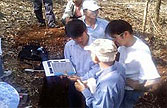
Third Country Training Course for Acid Deposition Monitoring and Assessment
In East Asia, there is a concern that damage from acid deposition and air pollution would affect human health. In order to combat acid deposition, we need to work with countries across the region to strengthen monitoring systems, perform emission inventories, take emission reduction measures etc. in each country given the extent of the problem. This training is implemented in Thailand with lecturers from Japan for trainees from the surrounding countries.
- Actions for Water Issues
Senegal: Rural Village Water Supply Project: Grant Aid Cooperation to Supply Safe Drinking Water
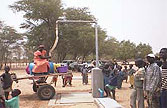
Rural Village Water Supply Project (Senegal)
Senegal is located in the arid region southwest of the Sahara desert and its land is suffering from desertification. Not only do rural residents have to depend on unsanitary shallow wells, they are also subjected to the hard manual labor of hauling water. Although the Government of Senegal has been trying to build water supply facilities in rural villages, more needs to be done. The Government of Senegal has formulated the Rural Village Water Supply Project and requested grant aid from Japan. This project is expected to build deep well water supply facilities in 14 villages and improve residential living and sanitation environment. From 1979 to date, Japan has provided grant aid to build rural water supply facilities on more than 10 occasions.
India: Yamuna Action Plan Project: Japanese ODA Loan Cooperation to Enhance
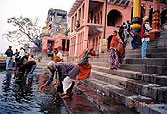
Yamuna Action Plan Project (India)
Yamuna River is rapidly being polluted as populations in its basin continue to grow. Pollution is primarily caused by raw sewerage and partially cremated bodies being dumped into the river. These customs pose a threat to the health of local people. The Yamuna Action Plan Project is an ambitious program to improve sewerage and other public health facilities in 15 cities located in 3 states in its basin and at the same time increase public awareness of sanitation. Seminars and workshops are being run in collaboration with local NGOs to promote and spread the use of public toilets, appropriate disposal of bodily remains, and bathing ghats as well as other facilities.
- Natural Environment Protection
Malaysia: Technical Cooperation Programme for Bornean Biodiversity and Ecosystem Conservation in Sabah: Technical Cooperation to Synthetically Promote Nature Conservation
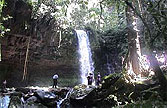
Technical Cooperation Programme for Bornean Biodiversity and Ecosystem Conservation in Sabah
Based on the experience of "Biodiversity Conservation Project Cooperation in Indonesia" which was implemented until FY 1993, "Technical Cooperation Programme for Bornean Biodiversity and Ecosystem Conservation in Sabah" was started in 2002 and is planned to continue for 5 years. The purpose of this project is to establish comprehensive measures and systems for a more sustainable approach to environment in and around Sabah by integrating research and education, administration and public environmental awareness. This project has strengthened cooperation among related institutions and raised public awareness of natural environment in Sabah. This has resulted in more effective park management, development of management plans for protected areas, and the establishment of new protected areas.
Palau: Palau International Coral Reef Center Strengthening Project
Grant Aid/Technical Cooperation to Conserve Global Coral Reefs

Palau International Coral Reef Center Strengthening Project
The government of Palau planned to establish the center where they conduct research activities for coral reef and related marine life and awareness activities for their conservation. The Palau International Coral Reef Center was opened with grant aid support from Japan in January 2001. This project aims to strengthen research and awareness. A mid-term strategy for the center is being implemented from October 2002 to September 2006. This center is the focal point for the global coral reef monitoring network and conservation in Micronesia region.
Photo from Millennium Development Goals (MDGs) Handbook (MOFA, 2005)
![]()
![]()
![]()
![]()
![]()
![]()



 (Open a New Window)
(Open a New Window)